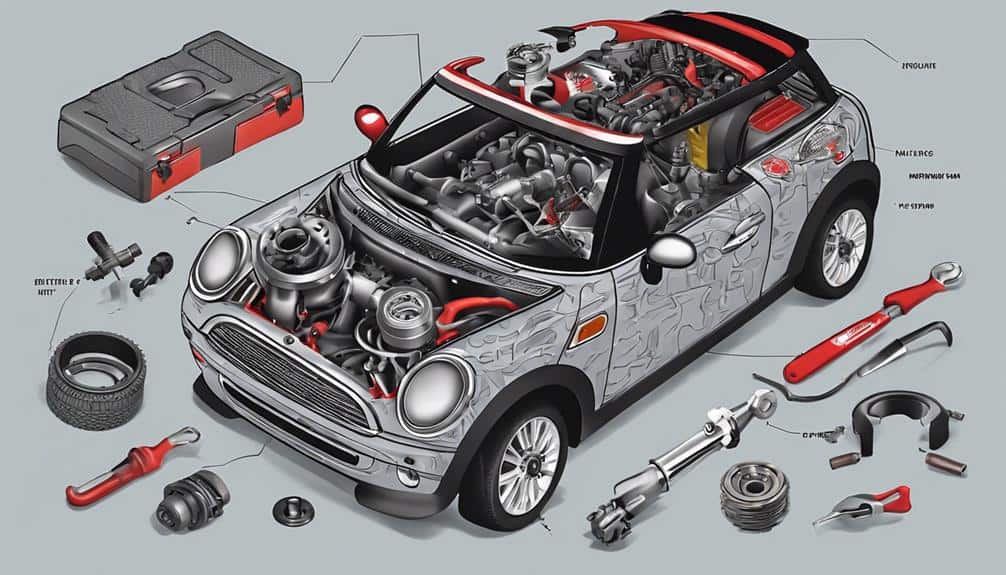Yes, your Mini Cooper does employ a hydraulic clutch system. This system relies on pressurized fluid – specifically brake fluid – to facilitate smoother engagement of gears, greatly reducing the physical effort required to operate the clutch. It consists of a master cylinder and a slave cylinder that work together to guarantee precise control and responsiveness whenever you change gears. This hydraulic mechanism not only contributes to a consistent pedal feel but also simplifies maintenance tasks. Identifying problems such as a spongy pedal or gear grinding early can prevent major issues. Understanding the intricacies of this system enhances your Mini's performance and your driving experience.
Understanding Hydraulic Clutches
Understanding hydraulic clutches begins with recognizing that they utilize pressurized fluid to facilitate smoother and more efficient clutch engagement, eliminating the need for mechanical cables. In the context of your MINI Cooper, this system relies on a master and slave cylinder duo to operate. When you press down on the clutch pedal, it's not just a simple mechanical action. Instead, this action moves pressurized brake fluid from the master cylinder through a series of lines to the slave cylinder. This movement is what ultimately allows for the clutch to disengage smoothly.
The hydraulic clutch's reliance on pressurized brake fluid is key to its smooth operation. Unlike older, cable-operated systems, which can require more physical effort and can suffer from cable stretch or breakage, the hydraulic system in your MINI Cooper ensures a consistent feel at the clutch pedal. This is essential for precise control over gear changes and contributes to a more enjoyable driving experience. Additionally, the design of the hydraulic clutch system, with its easily accessible slave cylinder, underscores the vehicle's engineering towards efficiency and ease of maintenance.
Mini Cooper Clutch System Overview
You're now familiar with the basics of hydraulic clutches, so it's important to understand how the Mini Cooper incorporates this system.
Mini Cooper models, including the Cooper and Cooper S, utilize a hydraulic clutch engagement system, eliminating the need for traditional cable actuation.
This system not only reduces the physical effort required to operate the clutch but also showcases specific signs when failure occurs, guiding effective maintenance and repair.
Clutch Mechanism Basics
Mini Cooper models utilize a hydraulic clutch system, comprising a master cylinder, a slave cylinder, and pressurized brake fluid, to facilitate smoother and less effort-intensive clutch engagement. This system eliminates the need for traditional mechanical linkage by using fluid to transfer pressure from the pedal to the clutch mechanism itself.
When you press the clutch pedal, the master cylinder is activated, pushing fluid through the system to the slave cylinder. This action, in turn, engages or disengages the clutch from the engine, allowing for gear changes. The hydraulic system's design guarantees precise control and responsiveness, greatly reducing the physical effort needed to operate the clutch and enhancing the driving experience.
Understanding this system's components and how they interact is essential for diagnosing issues and maintaining your Mini Cooper's performance.
Hydraulic System Presence
Within your Mini Cooper, the hydraulic clutch engagement system operates without the need for traditional cables, offering a more efficient and less strenuous driving experience. This advanced setup comprises a clutch master cylinder, a slave cylinder, and durable hydraulic lines, all meticulously designed to work in harmony.
As you depress the clutch pedal, hydraulic fluid is propelled from the master to the slave cylinder, activating the pressure plate and allowing gear changes with minimal effort. Unlike cable systems, this hydraulic mechanism requires much less physical exertion, enhancing both performance and reliability.
However, be alert for signs of hydraulic system failure, such as a spongy clutch pedal, gear grinding, long pedal travel, or hydraulic leaks, which indicate the need for immediate attention to maintain your Mini Cooper's top-notch driving experience.
Common Clutch Problems
Experiencing issues like a spongy clutch pedal or gear grinding can indicate common clutch problems in your Mini Cooper, requiring prompt attention. These symptoms often arise from faults within the hydraulic system, particularly involving the master or slave cylinder. When your clutch pedal feels spongy, or you're facing difficulty shifting gears, it's likely due to hydraulic leaks or loss of clutch pressure, pointing towards a compromised cylinder.
Moreover, if you notice a rattling noise in neutral or experience grinding during gear changes, these issues, though sometimes mistaken for transmission problems, are typically related to the hydraulic system of your clutch. Such problems can lead to delayed vehicle movement after clutch engagement, further complicating the driving experience.
To address these issues effectively, seeking professional diagnosis is essential. Only experienced mechanics can provide an accurate diagnosis, distinguishing between the need for a simple repair or a complete clutch replacement. Scheduling a professional examination can save you from unnecessary expenses and ensure your Mini Cooper receives the proper maintenance it requires, keeping common clutch problems at bay.
Maintenance Tips
Having outlined common clutch problems, it's essential to focus on how regular maintenance can prevent these issues in your Mini Cooper's hydraulic clutch system. The hydraulic clutch engagement system, a key component in both MINI Cooper and Cooper S models, relies on the precise management of fluid levels and the absence of leaks to guarantee smooth clutch actuation. You must routinely check the hydraulic fluid levels, as low levels can lead to inadequate clutch engagement or disengagement, greatly impacting your driving experience.
Promptly addressing any signs of leakage is vital. Even minor leaks can lead to air entering the system, compromising the hydraulic pressure needed for proper clutch operation. Periodic bleeding of the hydraulic clutch system is also crucial. This maintenance task removes any air pockets that may have formed within the system, restoring its efficiency and responsiveness.
For any issues beyond basic maintenance, such as persistent fluid loss or uncharacteristic clutch behavior, seeking professional diagnosis and repair services is highly recommended. Experts specializing in Mini Cooper vehicles can offer the precise, knowledgeable service your car needs, ensuring the hydraulic clutch system functions efficiently and reliably.
Master and Slave Cylinder Functions
To understand your Mini Cooper's hydraulic clutch system thoroughly, it's essential to grasp the roles of the master and slave cylinders. When you press down on the clutch pedal, you're initiating a process in the master cylinder, which houses hydraulic fluid. This action moves a piston inside the master cylinder, building up hydraulic pressure essential for the system's operation.
This built-up hydraulic pressure is then directed towards the slave cylinder. It's in the slave cylinder where this pressure is transformed into mechanical force. This force is what engages and disengages your Mini Cooper's clutch, allowing for smooth gear shifts without the need for direct mechanical linkage.
Both the master and slave cylinders are vital for the efficient functioning of your Mini Cooper's hydraulic clutch system. The master cylinder's role is to initiate the hydraulic pressure needed, while the slave cylinder's job is to convert that pressure into the mechanical force necessary for operating the clutch. Without either cylinder performing its function correctly, you'd notice a significant drop in your vehicle's performance, particularly in how the clutch feels and operates. Understanding these components helps you keep your Mini Cooper's clutch system in top condition.
Hydraulic Fluid Basics
Understanding the roles of the master and slave cylinders sets the stage for grasping the role of hydraulic fluid in your Mini Cooper's clutch system. This fluid is indispensable, acting as the lifeblood of your vehicle's hydraulic system. When you depress the clutch pedal, it's the hydraulic fluid that transfers this pressure, enabling clutch engagement. Without it, the seamless operation we've come to expect from a Mini Cooper's clutch would be impossible.
Proper maintenance of the hydraulic fluid is not just recommended; it's essential. This includes regular checks for leaks and ensuring the fluid is at the correct level and condition. Any neglect here can lead to significant clutch engagement problems, affecting your driving experience.
| Aspect | Importance | Emotional Trigger |
|---|---|---|
| Pressure | Essential for clutch engagement | Confidence |
| Hydraulic Fluid | Lifeblood of the system | Vitality |
| Maintenance | Prevents issues, ensures smooth operation | Peace of Mind |
| Leaks | Can lead to failure | Urgency |
This table emphasizes the emotional aspects tied to the technical maintenance of your Mini Cooper's hydraulic system. Ensuring the integrity and functionality of this system is not just about technical diligence—it's about ensuring the joy and reliability of your driving experience.
Troubleshooting Clutch Issues
When your Mini Cooper's clutch starts acting up, it's essential to pinpoint whether the issue lies within the hydraulic system. The Mini Cooper uses a hydraulic clutch system, which eliminates the need for cables, relying instead on fluid pressure for clutch engagement. One common sign of hydraulic system failure is a spongy pedal feel, indicating potential issues with the master or slave cylinder, or leaks within the clutch hydraulic line. This spongy feel can lead to gear grinding and long pedal travel, symptoms that shouldn't be overlooked.
Troubleshooting should begin with checking for leaks in the clutch hydraulic line and evaluating the condition of the master and slave cylinders. Loss of hydraulic fluid pressure can lead to these components failing to disengage the clutch properly, resulting in difficulty shifting gears, gear grinding, and even transmission problems. These symptoms can sometimes be mistaken for clutch issues when they're actually indicative of broader transmission problems, including rattling noises in neutral and unusual vibrations.
Professional diagnosis is vital in these situations. Only a qualified technician can accurately differentiate between a failing clutch system and transmission problems, ensuring that your Mini Cooper receives the appropriate maintenance and repairs.
Professional Repair Advice
If you're experiencing issues with your Mini Cooper's hydraulic clutch, seeking professional repair advice is an essential step towards ensuring accurate diagnosis and effective solutions. Your Mini Cooper relies on a hydraulic clutch system, where hydraulic fluid transmits pressure from the master cylinder to the slave cylinder, facilitating smooth clutch engagement without the need for cables. However, diagnosing hydraulic issues accurately can be complex, involving the slave cylinder, clutch slave cylinder, and other components.
Here are three key reasons why professional repair advice isn't just recommended but vital:
- Expertise in Diagnosing Hydraulic Issues: Professionals have the technical knowledge to identify the root cause, whether it's a problem with the slave cylinder or another component of the hydraulic clutch system.
- Accurate Solutions: They provide precise, effective repair or replacement options tailored to your Mini Cooper Clutch, ensuring longevity and performance.
- Safety and Reliability: Properly addressing hydraulic clutch issues ensures the safety and reliability of your vehicle, preventing further damage and costly repairs down the line.
Don't underestimate the importance of professional repair advice when it comes to maintaining the integrity of your Mini Cooper's hydraulic clutch system.
Conclusion
In the intricate dance of your Mini Cooper's mechanics, the hydraulic clutch plays a pivotal role, ensuring your rides are smooth and your changes seamless.
Remember, keeping an eye on the master and slave cylinders, along with the lifeblood—hydraulic fluid—can prevent the more temperamental aspects of your vehicle from taking center stage.
Regular maintenance and a keen sense for troubleshooting can keep your Mini performing its mechanical ballet flawlessly. Trust in professional advice for those moments when you need a guiding hand.

